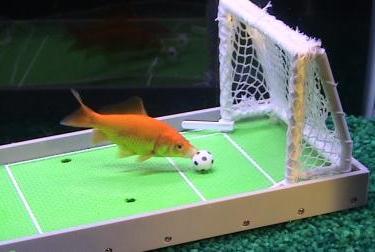Fish are smart, interesting animals with their own unique personalities, and just like dogs, cats, and humans, fish feel pain. Scientists who study pain are in complete agreement that the fish pain response is basically identical to the pain response system in mammals and birds.
Did you know that fish can also learn to avoid nets by watching other fish in their group and that they can recognize individual "shoal mates"? Some fish gather information by eavesdropping on others, and some—such as the South African fish who lay eggs on leaves so that they can carry them to a safe place—even use tools.
Anyone who made it through Biology 101 knows that fish have nerves and brains that sense pain, just as all animals do. Dr. Donald Broom, a scientific advisor to the British government, explains, "The scientific literature is quite clear. Anatomically, physiologically and biologically, the pain system in fish is virtually the same as in birds and mammals."
Neurobiologists have long recognized that fish have nervous systems that comprehend and respond to pain. Scientists tell us that fish brains and nervous systems closely resemble our own. For example, fish (like "higher vertebrates") have neurotransmitters such as endorphins that relieve suffering; the only reason for their nervous systems to produce these painkillers is to relieve pain. Researchers have created a detailed map of pain receptors in fish's mouths and all over their bodies. A team at the University of Guelph in Canada recently surveyed the scientific literature on fish pain and intelligence. They concluded that fish feel pain and that "the welfare of fish requires consideration."
A two-year study by scientists at Edinburgh University and the Roslin Institute in the U.K. proved what many marine biologists have been saying for years: Fish feel pain, just as all animals do. Anglers may not like to think about it, but fish suffer when they are impaled in the mouth and pulled into an environment in which they cannot breathe. Said Dr. Lynne Sneddon, who headed the study,"Really, it's kind of a moral question. Is your angling more important than the pain to the fish?"
A study by scientists at Queen's University Belfast proved that fish learn to avoid pain, just like other animals. Rebecca Dunlop, one of the researchers, said, "This paper shows that pain avoidance in fish doesn't seem to be a reflex response, rather one that is learned, remembered and is changed according to different circumstances. Therefore, if fish can perceive pain, then angling cannot continue to be considered a noncruel sport."
Fish can also suffer from fear and anticipation of physical pain. Researchers from universities across America have published research showing that some fish use sound to communicate distress when nets are dipped into their tanks or they are otherwise threatened. In a separate study, researcher William Tavolga found that fish grunted when they received an electric shock. In addition, the fish began to grunt as soon as they saw the electrode in anticipation of the torment that Tavolga was inflicting on them.
According to Dr. Michael Fox, D.V.M., Ph.D., "Even though fish don't scream [audibly to humans] when they are in pain and anguish, their behavior should be evidence enough of their suffering when they are hooked or netted. They struggle, endeavoring to escape and, by so doing, demonstrate they have a will to survive."
P.S. This text was copied from www.peta.org

This is an amazing photo of a fish using tools- a trait once thought to define humanity. By that standard, shouldn't fish be considered people?

One of many goldfish trained to play soccer.